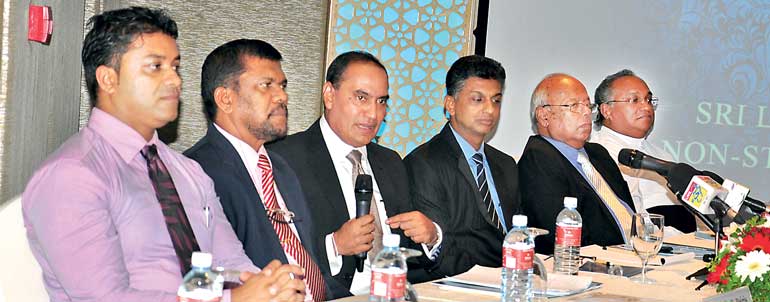Private institutes, Ministry of Education planning Rs. 500 m ‘voucher system’ for students
- Home
- Our Latest News
- Private institutes, Ministry of Education planning Rs. 500 m ‘voucher system’ for students

Professor Lalith Gamage, President of the newly inaugurated Sri Lanka Association of Non-State Higher Education Institutes (SLANSHEI) said yesterday that talks have been held with the Ministry of Education to create a new loan system for students who cannot afford to pay for higher education.
The plan, which is inspired by Prime Minister Ranil Wickremesinghe’s policy statement of creating a voucher system for students, is currently estimated to require an investment of around Rs. 500 m by the government.
“The plan is to ensure that the allocated funds replenish themselves as students graduate and repay their debts. Ministry officials are so far pleased with the plans and will make a formal requestfor budget allocation next year,” he said.
Gamage deplored the lack of capacity in the public education sector and the large number of qualified students who went without university placement every year. “There are about 150,000 A’Level students who qualify to enter a government university. However, only 25,000 places are available. So about 125,000 eligible students do not have university placement in this country.”
“Out of this number, there aren’t enough students who have money to go through a private program in Sri Lanka so they need to have a proper loan or voucher scheme as the prime Minister has suggested,” Gamage said.
With discussions having taken place since 2008, SLANSHEI was formed as an association last year and inaugurated yesterday at the JAIC Hilton. The association aims to work with the government on issues of higher education and seek redress for the specific concerns of private or ‘non-state’ institutes.
SLANSHEI representatives have said that they have so far met with Minister of Higher Education and Highways Lakshman Kiriella and State Minister Mohan Lal Grero and were assured full support for their endeavours.
The newly appointed President of SLANSHEI pledged to stem the estimated 12,000 domestic students who seek education overseas by raising education to an international standard. Citing the success of Australia, whose fifth largest foreign exchange earner is education, Gamage outlined plans to keep domestic students while also luring more foreign students to private institutes – especially from the South Asia region and Africa.
Said Gamage, “We want to exhibit our services overseas and are planning to work with organisations like the Expo Development. Some of our member institutions have networks overseas and we will use their agents in other countries to make inroads into these markets.” However, Gamage said that there were critical challenges to making Sri Lanka a destination for foreign students. Among them is the difficulty of getting recognition to award degrees and the legal inability for any private or non-state institute to describe itself as a university.
Gamage also said that SLANSHEI will lobby the government to provide grants for research so as to help private and non-state institutes rise up global rankings in education, making them more desirable for foreign students.
Addressing negative sentiment towards private and non-state education initiatives, Gamage charged, “A lot of people think that we are going to destroy free education. That’s not so. We know for a fact that the government is unable to keep up and they want to develop higher education capacity with the non state sector.”
SLANSHEI is offering 50 scholarships to students based on academic merit and economic need.
Registered under the Companies Act as an Association, the founding members of SLANSHEI are the Sri Lanka Institute of Information technology (SLIIT), Colombo International Nautical and Engineering College (CINEC), Horizon Campus, South Asian Institute of technology and Medicine (SAITM), Aquinas University College, Institute of Chartered Accountants Sri Lanka (ICASL) and the Asia Pacific Institute of Information Technology (APIIT).
SLANSHEI is open to new members and launched its official website yesterday.
